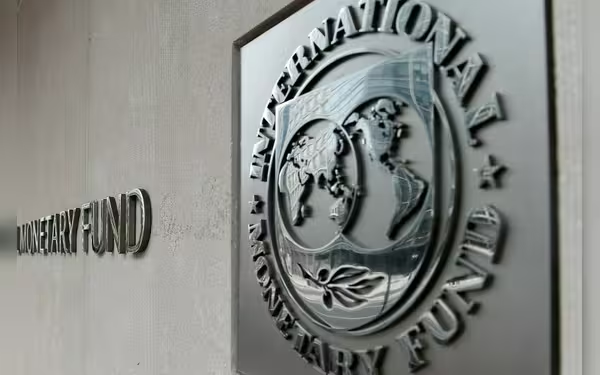Saturday, November 16, 2024 05:54 PM
IMF Raises Concerns Over Pakistan's Loan Repayment Capacity
- IMF warns of high risks to Pakistan's repayment ability.
- Projected exposure to IMF could reach SDR 8,774 million by 2027.
- Fiscal responsibility is crucial for Pakistan's economic stability.
 Image Credits: brecorder
Image Credits: brecorderThe IMF has raised alarms about Pakistan's ability to repay loans, citing high risks and the need for effective policy implementation.
Pakistan's financial landscape is currently under scrutiny as the International Monetary Fund (IMF) has raised alarms regarding the country's ability to repay its loans. The IMF, a key player in global finance, has highlighted significant risks that could hinder Pakistan's repayment capacity. This situation is particularly concerning given the country's reliance on external financing and the implementation of effective policies.
According to the IMF's staff report, Pakistan's exposure to the Fund is projected to reach SDR 6,816 million by September 2024, which is a staggering 336% of its quota. The report indicates that if all purchases under the current arrangement are completed, this exposure could peak at SDR 8,774 million by September 2027, amounting to 432% of the quota. This figure is approximately double the average for recent Extended Fund Facility (EFF) arrangements.
In July, the IMF and Pakistani authorities reached a staff-level agreement for a $7 billion loan program that spans 37 months. This program aims to stabilize the economy and promote inclusive growth. However, the IMF has pointed out that exceptionally high risks, such as soaring public debt, low gross reserves, and sociopolitical instability, could jeopardize the implementation of necessary policies. These factors could ultimately erode Pakistan's ability to repay its debts and maintain debt sustainability.
The IMF emphasized that restoring fiscal and external viability is crucial for ensuring Pakistan's capacity to repay the Fund. This restoration depends on strong and sustained policy implementation, which includes fiscal consolidation, external asset accumulation, and decisive reforms aimed at fostering robust economic development.
Despite these challenges, the IMF has assured that the program is fully financed, with firm commitments for the first 12 months and promising prospects for the future. Financing for the fiscal year 2025 includes $16.8 billion in rollovers of existing short-term financing and an additional $2.5 billion in commitments from countries like China and Saudi Arabia, as well as institutions such as the Asian Development Bank (ADB) and the Islamic Development Bank (IsDB).
Furthermore, the authorities have secured commitments from key bilateral partners to maintain their existing financial exposures throughout the program. This includes rolling over short-term liabilities, which will help meet financing needs during the program's duration. Additionally, loans from foreign commercial banks, totaling $6.6 billion, are expected to continue during this new program period.
While these commitments provide a safety net, the IMF has cautioned that financing risks remain high. Continuous monitoring will be essential to ensure that financing is timely and adequate during program reviews. The situation calls for vigilance and proactive measures to safeguard Pakistan's economic future.
Pakistan stands at a critical juncture in its economic journey. The IMF's warnings serve as a reminder of the importance of sound financial management and the need for effective policy implementation. As the country navigates these turbulent waters, it is imperative for the government to prioritize fiscal responsibility and seek sustainable growth strategies. Only through concerted efforts can Pakistan hope to enhance its repayment capacity and secure a stable economic future.













